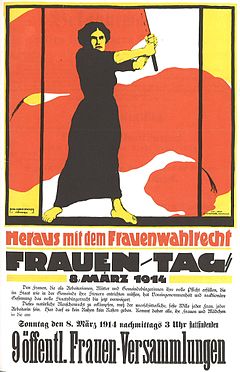
Back Internationaler Frauentag ALS اليوم العالمي للمرأة Arabic يوم الستات الدولى ARZ আন্তৰ্জাতিক নাৰী দিৱস Assamese Día Internacional de la Muyer AST अन्तरराष्ट्रीय महिला दिवस AWA Beynəlxalq Qadınlar Günü Azerbaijani Халыҡ-ара ҡатын-ҡыҙҙар көнө Bashkir Міжнародны жаночы дзень Byelorussian Міжнародны жаночы дзень BE-X-OLD
| International Women's Day | |
|---|---|
 German poster for International Women's Day, March 8, 1914.[a] This poster was banned in the German Empire.[2] | |
| Observed by | Worldwide |
| Type | International |
| Significance |
|
| Date | March 8 |
| Next time | March 8, 2025 |
| Frequency | Annual |
| Related to | Mother's Day, Children's Day, International Men's Day |
| Part of a series on |
| Feminism |
|---|
 |
|
|
International Women's Day (IWD) is a holiday celebrated annually on March 8 as a focal point in the women's rights movement. IWD gives focus to issues such as gender equality, reproductive rights, and violence and abuse against women.[3][4] Spurred by the universal female suffrage movement, IWD originated from labor movements in North America and Europe during the early 20th century.[5][6][7]


The earliest version reported was a "Woman's Day" organized by the Socialist Party of America in New York City on February 28, 1909. This inspired German delegates at the 1910 International Socialist Women's Conference in Copenhagen to propose "a special Women's Day" be organized annually, albeit with no set date;[8] the following year saw the first demonstrations and commemorations of International Women's Day across Europe. After the Russian Revolution in 1917, IWD was made a national holiday on March 8;[9] it was subsequently celebrated on that date by the socialist movement and communist countries. The holiday became a mainstream global holiday following its promotion by the United Nations in 1977.[10]
International Women's Day is a public holiday in several countries. The UN observes the holiday in connection with a particular issue, campaign, or theme in women's rights.[6]
- ^ "Give Us Women's Suffrage (March 1914)". German History in Documents and Images. Archived from the original on February 2, 2014. Retrieved January 26, 2014.
- ^ Frencia, Cintia; Gaido, Daniel (March 8, 2017). "The Socialist Origins of International Women's Day". Jacobin. Archived from the original on March 9, 2017. Retrieved March 8, 2017.
- ^ "About International Women's Day". International Women's Day. Archived from the original on June 3, 2016. Retrieved March 8, 2021.
- ^ "International Women's Day". United Nations. Archived from the original on March 7, 2021. Retrieved March 8, 2021.
- ^ "History of International Women's Day". International Women's Day. Archived from the original on March 7, 2021. Retrieved March 8, 2021.
- ^ a b Nations, United. "Background | International Women's Day". United Nations. Archived from the original on March 8, 2020. Retrieved March 8, 2021.
- ^ "Stories of women's activism". nzhistory.govt.nz. Archived from the original on February 18, 2022. Retrieved February 18, 2022.
- ^ ""International Socialist Congress, 1910; Second International Conference of Socialist Women". p. 21. Retrieved March 7, 2020.
- ^ Pruitt, Sarah (September 13, 2023). "The Surprising History of International Women's Day". HISTORY. Retrieved November 2, 2023.
- ^ "International Women's Day, 8 March". United Nations. Archived from the original on March 8, 2020. Retrieved March 7, 2020.
Cite error: There are <ref group=lower-alpha> tags or {{efn}} templates on this page, but the references will not show without a {{reflist|group=lower-alpha}} template or {{notelist}} template (see the help page).